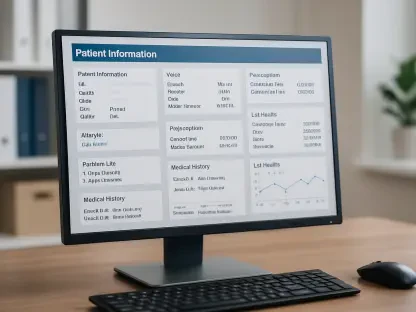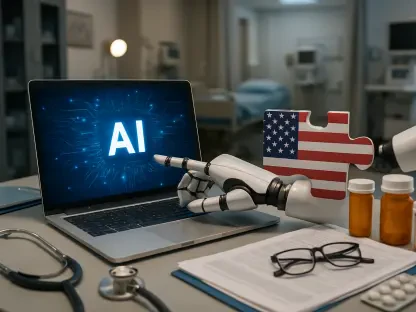In today’s rapidly advancing field of medical science, artificial intelligence stands as a beacon of innovation with the potential to transform healthcare practices by elevating data analysis and research to unprecedented heights. As technology intertwines with medicine, AI offers groundbreaking capabilities for deciphering complex datasets with remarkable precision and efficiency, addressing longstanding challenges faced by researchers. The evolution of AI involves a shift from traditional manual processes to sophisticated, automated systems capable of parsing intricate details from vast amounts of unstructured medical data. By harnessing the power of large language models, AI derives valuable insights from digital records, thereby playing a pivotal role in shaping the future of clinical research and decision-making.
Emerging AI Solutions in Healthcare
One promising development in integrating AI into healthcare is the innovative system engineered by UT Southwestern Medical Center. This AI-enabled system facilitates the extraction and analysis of data from free-text medical records, signaling a breakthrough in efforts to streamline large-scale clinical studies. The system’s core lies in a collaborative effort bringing together an interdisciplinary team of AI scientists, pathologists, and clinicians who designed an AI-powered pipeline. This pipeline effectively automates the conversion of narrative data into analysis-ready formats, bypassing lengthy and labor-intensive manual processes. Testing on over 2,200 kidney cancer pathology reports demonstrated its high accuracy in identifying tumor types and metastasis, achieving reliability comparable to existing electronic medical records.
The impact of this AI-driven approach extends beyond immediate accuracy improvements. It also signifies the opening of new avenues for refining clinical data extraction methodologies. With AI, researchers can tap into diverse datasets across tumor types and adapt their processes to encompass varied clinical scenarios. The integration of AI promises to alleviate bottlenecks in conventional data handling, which often impedes timely analysis. By doing so, AI systems not only enhance the robustness of clinical research findings but also pave the way for more timely and evidence-based treatment decisions in patient care. Through continuous refinement and validation, these AI frameworks stand to offer predictive insights that cater to the complexities of modern healthcare systems.
Interdisciplinary Collaboration and AI Refinement
The success of AI applications in medical research is frequently rooted in the interdisciplinary collaboration that brings together diverse fields to synergize their expertise. At UT Southwestern Medical Center, the convergence of teams from bioinformatics, pathology, and clinical science underscores the necessity of collaborative efforts in advancing AI solutions. This collaborative dynamic ensures the refinement of systems capable of managing complex medical data, converting it from narrative form into structured information without losing essential nuances. Such complexity demands sophisticated AI systems designed to interpret detailed information accurately and reliably, evoking a sense of trust in the data extracted.
Examples of interdisciplinary collaboration abound within the AI refinement process, where researchers work closely with language models to address the intricacies of analyzing medical documents. Addressing fundamental challenges such as the variety of terms used to describe similar findings necessitates ongoing coordination and iterative improvements. By doing so, the AI models increase their accuracy and adaptability, highlighting a compelling trend within medical informatics. This trend not only emphasizes the transformative force of AI in medicine but also reinforces its role as a facilitator of more precise, swift, and comprehensive data interpretation, which is crucial for advancing research and clinical practice alike.
Real-World Implications and Future Prospects
AI’s integration into medical research introduces real-world implications that promise to redefine the landscape of biomedical sciences and healthcare delivery. The development and successful implementation of AI-driven processes are significant in that they allow for enhanced accuracy and speed in assessing medical data. The automation of such processes reduces human workload significantly while maintaining robust data quality, which is crucial for ensuring patient safety and improving health outcomes. Through the application of these AI models, researchers can effectively overcome the variability and complexity inherent in clinical language, as AI systems possess the capability to adjust and learn through careful programming and oversight.
In the foreseeable future, AI is anticipated to continue expanding its role within various medical specialties, further enhancing data processing capabilities and enriching research methodologies. As demonstrated by institutions like UT Southwestern, AI provides tools that streamline and improve the efficiency of healthcare practices, supporting the vision for more integrated and AI-augmented research frameworks. Moreover, with institutions offering robust backing—from grants to specialization programs—AI’s scope for applications in diverse fields continues to broaden. The cumulative effect of such advancements may very well evolve the current paradigms of clinical studies, driving research to be faster, more cost-effective, and ultimately more impactful on patient care.
Envisioning the Future
A promising innovation in healthcare AI is the system developed by UT Southwestern Medical Center. This AI-enabled system efficiently extracts and analyzes data from free-text medical records, marking a significant advancement in streamlined clinical research. The backbone of this system is a collaborative effort involving AI scientists, pathologists, and clinicians who have developed an AI-powered pipeline. This pipeline automates the conversion of narrative data into formats ready for analysis, eliminating the need for lengthy manual processes. Testing on over 2,200 kidney cancer pathology reports demonstrated remarkable accuracy in identifying tumor types and metastasis, achieving reliability akin to existing electronic medical records.
Beyond instant accuracy improvements, this AI-driven approach unlocks new possibilities for enhancing clinical data extraction. AI allows researchers to utilize varied datasets and adjust processes for different clinical scenarios, addressing bottlenecks in traditional data handling. Such integration not only strengthens clinical research but also promotes timely and evidence-based treatment decisions, offering predictive insights for modern healthcare challenges.









